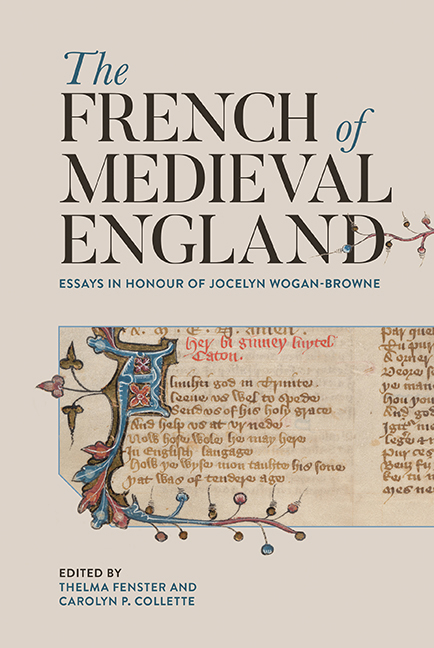Book contents
- Frontmatter
- Contents
- List of Illustrations
- List of Contributors
- List of Abbreviations
- Foreword: ‘The Light I Never Left Behind’: Jocelyn Wogan-Browne
- Introduction: Recognizing the French of Medieval England
- 1 The Gloss to Philippe de Thaon's Comput and the French of England's Beginnings
- 2 The Scandals of Medieval Translation: Thinking Difference in Francophone Texts and Manuscripts
- 3 Contrafacture and Translation: The Prisoner's Lament
- 4 Complaining about the King in French in Thomas Wright's Political Songs of England
- 5 The Chanson d’Aspremont in Bodmer 11 and Plantagenet Propaganda
- 6 The Use of Anglo-Norman in Day-to-Day Communication during the Anglo-Scottish Wars (1295–1314)
- 7 Middle English Borrowing from French: Nouns and Verbs of Interpersonal Cognition in the Early South English Legendary
- 8 William Langland Reads Robert Grosseteste
- 9 Disability Networks in the Campsey Manuscript
- 10 English Women and Their French Books: Teaching about the Jews in Medieval England
- 11 French Residents in England at the Start of the Hundred Years War: Learning English, Speaking English and Becoming English in 1346
- 12 French Immigrants and the French Language in Late-Medieval England
- 13 Fashioning a Useable Linguistic Past: The French of Medieval England and the Invention of a National Vernacular in Early Modern France
- 14 Admiring Ambivalence: on Paul Meyer's Anglo-Norman Scholarship
- 15 Twenty-First Century Gower: The Theology of Marriage in John Gower's Traitié and the Turn toward French
- 16 Royaumes sans frontières: The Place of England in the Long Twelfth Century
- Afterword
- Bibliography
- Index
- Publications of Jocelyn Wogan-Browne
- Tabula Gratulatoria
2 - The Scandals of Medieval Translation: Thinking Difference in Francophone Texts and Manuscripts
Published online by Cambridge University Press: 12 August 2020
- Frontmatter
- Contents
- List of Illustrations
- List of Contributors
- List of Abbreviations
- Foreword: ‘The Light I Never Left Behind’: Jocelyn Wogan-Browne
- Introduction: Recognizing the French of Medieval England
- 1 The Gloss to Philippe de Thaon's Comput and the French of England's Beginnings
- 2 The Scandals of Medieval Translation: Thinking Difference in Francophone Texts and Manuscripts
- 3 Contrafacture and Translation: The Prisoner's Lament
- 4 Complaining about the King in French in Thomas Wright's Political Songs of England
- 5 The Chanson d’Aspremont in Bodmer 11 and Plantagenet Propaganda
- 6 The Use of Anglo-Norman in Day-to-Day Communication during the Anglo-Scottish Wars (1295–1314)
- 7 Middle English Borrowing from French: Nouns and Verbs of Interpersonal Cognition in the Early South English Legendary
- 8 William Langland Reads Robert Grosseteste
- 9 Disability Networks in the Campsey Manuscript
- 10 English Women and Their French Books: Teaching about the Jews in Medieval England
- 11 French Residents in England at the Start of the Hundred Years War: Learning English, Speaking English and Becoming English in 1346
- 12 French Immigrants and the French Language in Late-Medieval England
- 13 Fashioning a Useable Linguistic Past: The French of Medieval England and the Invention of a National Vernacular in Early Modern France
- 14 Admiring Ambivalence: on Paul Meyer's Anglo-Norman Scholarship
- 15 Twenty-First Century Gower: The Theology of Marriage in John Gower's Traitié and the Turn toward French
- 16 Royaumes sans frontières: The Place of England in the Long Twelfth Century
- Afterword
- Bibliography
- Index
- Publications of Jocelyn Wogan-Browne
- Tabula Gratulatoria
Summary
This chapter seeks to develop some of the broader theoretical ramifications of the pioneering work undertaken by Jocelyn Wogan-Browne on the languages and cultures of medieval Britain. Her scholarship has paid meticulous attention to multilingualism in Britain, in ways that have often challenged more traditional literary histories and narratives of linguistic change. As part of this rethinking of literary and socio-linguistic histories, Wogan-Browne has also encouraged scholars working on both the French and English traditions to reconsider some of the linguistic and literary terminology that often shapes their objects of study. The present discussion is much indebted to this work, which has already raised important questions concerning how terms such as ‘language’, ‘multilingualism’ and ‘translation’ might be thought about in post-Conquest contexts.
Discussions of translation today often draw attention to ethical questions concerning how far translation facilitates an engagement with various kinds of difference: does translation – particularly translation into modern English – accommodate the alterity at the heart of any translated work, or does it render it invisible? If the latter, how can translations avoid the assimilation or suppression of difference? To what extent is cultural homogenization an inevitable feature of the market in which translation operates? The work of Antoine Berman and Lawrence Venuti has been central in motivating discussion of the ethical and ideological stakes of translation, as well as in interrogating the ways in which translators may comply with or resist the ethnocentric tendencies of translation in the modern marketplace. My title deliberately echoes that of Venuti's influential monograph on translation ethics, The Scandals of Translation: Towards an Ethics of Difference. Here, as elsewhere in his work, Venuti argues against an assimilationist model of translation, advocating translation techniques that cultivate gaps and incompatibilities between languages, rather than seeking to smooth them out. Good, ethical translation in his view is demystifying in the sense that it manifests in its own language the foreignness of the foreign text (or ‘foreignizes’ it); ethical translation is also what he terms ‘minoritizing’, meaning that it cultivates a heterogeneous discourse that opens standard dialects, languages and literary canons to features of minority languages that may be alien to them.
- Type
- Chapter
- Information
- The French of Medieval EnglandEssays in Honour of Jocelyn Wogan-Browne, pp. 38 - 54Publisher: Boydell & BrewerPrint publication year: 2017
- 2
- Cited by



